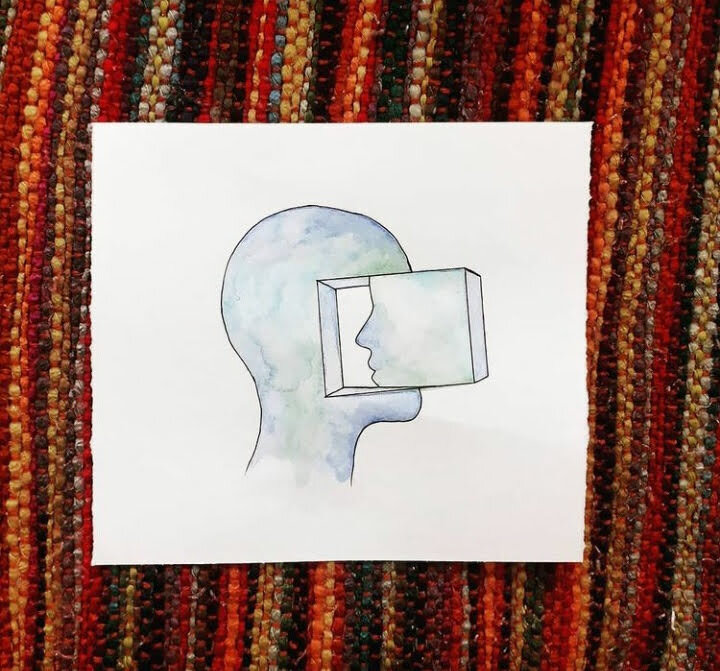Dissociation: What, Why And How To Help
Recently, the term ‘dissociation’ has come up in more and more of my client work. Two of my clients, just in the last six months, have recognised (for the first time for them) that they are dissociating. Covid-19 has brought a lot of new mental health challenges to many of us and this seems to be just one of the new things we might be having to get our heads around.
Ok, so what is dissociation?
The symptoms of dissociation might include memory loss, identity confusion (where we might lose sense of who we are), identity alteration (where our identity might change), loss of feeling and losing control of body movements.
Generally speaking, there are two main strands of dissociation: depersonalisation and derealisation.
Simply put, depersonalisation is where we might feel like we have left our body – maybe like we’re watching ourselves from the outside. Derealisation is when we feel separated from our surroundings, it might feel like the world around us isn’t real, or like we’re dreaming.
For many of us, these symptoms are fleeting. Our brains switch us into this mode to cope or to relieve us from a certain level of anxiety or stress, and then we “come back”.
If we do dissociate for longer periods of time, then we might develop a “dissociative disorder”. This is when dissociation develops into a more common occurrence, and becomes the main way we deal with stress.
Dissociating can feel scary! It’s really important to remember though, that it is a normal response to stress and/or trauma. Sometimes it can seem like only a physical ailment and not something you might think to mention to your therapist. Light-headedness, memory loss, not feeling pain – these are all tell-tale signs of dissociation. It’s tricky, because these are also often symptoms of lots of other things too, so while these are definitely worth mentioning to your therapist, speak to a doctor as well if you have any doubts.
Why would Covid-19 bring on a surge of dissociation among people?
The thing is, we dissociate when we need to cope with an otherwise overwhelming or intolerable situation. It’s a way that we deal with stress. Our brains whip us out from that environment for a few minutes, hours… sometimes whole days. We’ll dissociate more frequently during times of anxiety, a difficult relationship or during a traumatic event. Don’t forget that trauma isn’t always one big-scale event; it can be a build-up of smaller-scale traumas. These are things such as moving house, losing a job, having surgery, going through a divorce or, as it happens, living through a pandemic!
What to do about it
Use your senses – this can help quite immediately. During a session, sometimes clients will agree that if they begin to dissociate, I should just gently touch their arm or their back and it helps them to return to their mind/body.
When you’re on your own you can use this one by doing various things:
Smell - Having something strong smelling nearby can help. For example, an essential oil like peppermint, or even coffee, oranges or cinnamon.
Touch – using your hands to tap each fingertip against the top of your thumb, make a fist and let go, touch your clothing. This can provide you with subtle ways of bringing yourself back. If you need something firmer, clenching your fist or gently pinching yourself can work. One of my clients likes to hold ice cubes in their hand and finds this very effective.
Another thing we can do is engage in therapy. Among many other things, therapy can help us feel empowered over our emotions and the experiences that have caused the emotions. However, I do recognise that therapy is a luxury. So, try reaching out to family and/or friends and talking to them about it. Talking disempowers any feelings of shame or humiliation and slowly we might notice that dissociation happens less and less frequently. If there is no one you feel comfortable to talk about these things then write it down! Journaling is another great outlet and can also help us track and locate triggers.
Grounding techniques can also be a huge relief from dissociation. These include breathing techniques, meditation and yoga.
If you’ve been dissociating lately, don’t panic. It’s normal. If you’re dissociating for long periods at a time, or you suspect you might have a dissociative disorder, then seek professional help. Remember that blogs and social media aren’t substitutes for therapy! If you’re completely lost finding help or you just need to be pointed in the right direction, send me a message and we’ll see what the best option is for you.
